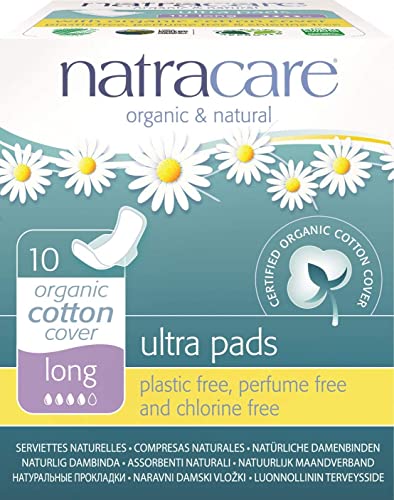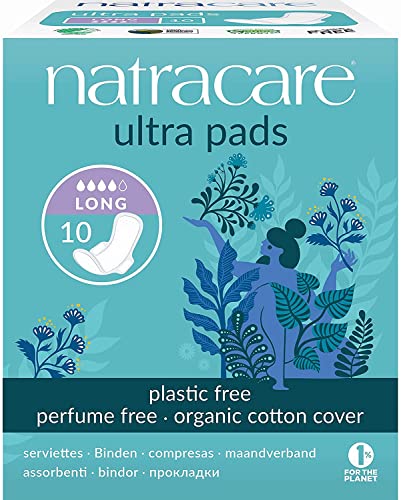

Natracare Menstrual Pads - Plastic-Free, Vegan, Biodegradable, Gynaecologist Recommended - 20 Ct


Zea Mays (Corn) Starch
Low RiskZea mays (corn) starch is a starch obtained from corn kernels, primarily used as a thickening and stabilizing agent in various cosmetic and food products. It serves as a binder and enhances texture, contributing to the overall formulation's consistency and stability.
Sustai Insights
Zea mays (corn) starch offers functional benefits such as acting as a thickening and stabilizing agent, which helps improve product texture. It is sustainably sourced and biodegradable, posing low health risks, including negligible concerns for carcinogenicity and allergies. Environmental risks are minimal, with no significant pollutant potential noted. Regulatory bodies have not issued advisories, indicating a low overall risk level. Safe usage practices involve ensuring appropriate concentrations in formulations. Alternatives include other plant-based starches or thickeners, which may offer similar functional benefits while maintaining sustainability.
Cellulose
Low RiskCellulose is a natural polysaccharide derived from plant cell walls, primarily used as a thickening agent, stabilizer, and emulsifier in cosmetic formulations. It is known for its ability to improve texture and consistency in products.
Sustai Insights
Cellulose serves as an effective thickening and stabilizing agent, enhancing product texture while being biodegradable and derived from renewable sources. Health risks are minimal, with low concerns regarding carcinogenicity, allergies, and reproductive toxicity. Environmental impacts are also low, as cellulose does not contribute significantly to pollution or bioaccumulation. Regulatory agencies have not issued restrictions on its use. Overall, cellulose presents a low risk profile, making it a suitable ingredient choice in cosmetics.
Zea Mays (Corn) Starch
Low RiskZea mays (corn) starch is a starch obtained from corn kernels, primarily used as a thickening and stabilizing agent in various cosmetic and food products. It serves as a binder and enhances texture, contributing to the overall formulation's consistency and stability.
Sustai Insights
Zea mays (corn) starch offers functional benefits such as acting as a thickening and stabilizing agent, which helps improve product texture. It is sustainably sourced and biodegradable, posing low health risks, including negligible concerns for carcinogenicity and allergies. Environmental risks are minimal, with no significant pollutant potential noted. Regulatory bodies have not issued advisories, indicating a low overall risk level. Safe usage practices involve ensuring appropriate concentrations in formulations. Alternatives include other plant-based starches or thickeners, which may offer similar functional benefits while maintaining sustainability.
Cellulose
Low RiskCellulose is a natural polysaccharide derived from plant cell walls, primarily used as a thickening agent, stabilizer, and emulsifier in cosmetic formulations. It is known for its ability to improve texture and consistency in products.
Sustai Insights
Cellulose serves as an effective thickening and stabilizing agent, enhancing product texture while being biodegradable and derived from renewable sources. Health risks are minimal, with low concerns regarding carcinogenicity, allergies, and reproductive toxicity. Environmental impacts are also low, as cellulose does not contribute significantly to pollution or bioaccumulation. Regulatory agencies have not issued restrictions on its use. Overall, cellulose presents a low risk profile, making it a suitable ingredient choice in cosmetics.
Make a sustainable choice for your menstrual health with Natracare's plastic-free period products. Designed for those who prioritize eco-friendliness, these pads offer a natural alternative to conventional options, ensuring comfort and care for sensitive skin.
- Plastic-Free: Each pad eliminates the need for plastic, reducing waste.
- Natural Materials: Crafted from organic cotton, free from harmful additives.
- Biodegradable: Pads break down into organic matter, enriching the soil.
- Ethical Production: Sourced and processed with respect for the environment.
- Vegan-Friendly: Supports a plant-based lifestyle, benefiting the planet.
- Gynaecologist Recommended: Safe for sensitive skin and allergy-prone individuals.
- Home Compostable: Conveniently compostable at home for added sustainability.
Subscribe & Save with Sustai
- Best Price Guarantee: Always enjoy the lowest prices on sustainable home essentials.
- No Surprises: We’ll notify you before shipping. No hidden fees, ever.
- You’re in Charge: Change, pause, or cancel your subscription anytime with ease.
- Eco-Friendly Deliveries: Our grouped shipments mean less packaging and lower emissions.
Join us on a sustainable journey. Special offers for a limited time! Prices and promotions may change.
Recommended Products
Make a sustainable choice for your menstrual health with Natracare's plastic-free period products. Designed for those who prioritize eco-friendliness, these pads offer a natural alternative to conventional options, ensuring comfort and care for sensitive skin.
- Plastic-Free: Each pad eliminates the need for plastic, reducing waste.
- Natural Materials: Crafted from organic cotton, free from harmful additives.
- Biodegradable: Pads break down into organic matter, enriching the soil.
- Ethical Production: Sourced and processed with respect for the environment.
- Vegan-Friendly: Supports a plant-based lifestyle, benefiting the planet.
- Gynaecologist Recommended: Safe for sensitive skin and allergy-prone individuals.
- Home Compostable: Conveniently compostable at home for added sustainability.

You can have at most 2 Sustainable Steals products in your cart
Customer Reviews
Customers’ View
Customers appreciate the comfort and eco-friendly attributes of the Natracare menstrual pads. Many users highlight the natural materials, noting that the pads are made from organic cotton and are free from harmful additives, which aligns well with their health-conscious values. Positive feedback emphasizes the biodegradable nature of the pads, with some customers expressing satisfaction over their home compostability. However, some reviews indicate concerns regarding the adhesive strength, with a few users experiencing issues with the pads not sticking securely. Despite this, the overall sentiment remains positive, as many find the pads effective and in line with their sustainable lifestyle choices.
AI-generated from the text of customer reviewsThis product has no reviews yet.




